Jan·?ek assembled the libretto for From the House of the Dead
from Dosteovesky’s ‘memoirs’ which were loosely disguised in
quasi-fictional form and published, predominantly in the journal Vremya, between 1860-62. The composer selected
characters and incidents from the author’s accounts of ceaseless
suffering, as well as incidents that occurred in the prison hospital
and on feast days. Each of the opera’s three acts, which proceed
without pause, focuses on an individual narrative of the violent
crimes, real and sometimes imagined, which have led to incarceration.
The successive narrations of aggression, brutality and murder become
increasingly dreadful and distressing.
There is no development of character, but as Pountney so powerfully and
disturbingly confirms, Jan·?ek creates incredibly probing psychological
studies. And, although individuals – the Tall Prisoner, the Short
Prisoner – emerge from and are re-subsumed into the mass of iniquity,
within the seemingly abstract design in which prisoners aimlessly
intermingle there is a huge range of emotions amid which an elusive but
indestructible hint of humanity survives. It is surely this combination
of abjection and compassion which attracted Jan·?ek – who inscribed his
score, ‘In every creature a spark of God’ – to Dostoevsky’s
recollections. Just as the latter aims for objectivity in presenting
the extremes to which man may be driven in order to survive, as
violence begets violence, so the composer does not aim to explain,
condemn or absolve. The words of Carl Dahlhaus seem apposite: ‘In
contrast to Wagner, who keeps up the running commentary on the
unfolding drama, Jan·?ek is not present in his own person, or
discoursing in his own words; he is more like an observer, standing
back unnoticed behind what he has to show us, which reveals itself in
its own terms.’
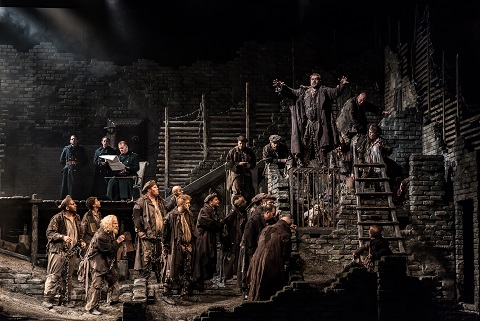 Cast of From the House of the Dead. Photo credit: Clive Barda.
Cast of From the House of the Dead. Photo credit: Clive Barda.
From the House of the Dead
is all the more unsettling for Jan·?ek’s unflinching realism. And, this
realism most forcefully resides in the astonishingly unconventional
orchestral score which Czech conductor Tom·ö Hanus brought to life with
searing precision and incisiveness. WNO are performing the new critical
edition prepared by esteemed Jan·?ek scholar John Tyrrell; heard here
for the first time, this authoritative edition further revises the
‘provisional’ edition based upon the 1928 copyists’ score (which
includes some of the composer’s revisions) which Tyrrell had prepared
with Charles Mackerras for the 1980 Decca recording of the opera.
Additions and instrumental doublings, along with the ‘ironing out’ of
the composer’s ‘idiosyncrasies’, which had been imposed by Jan·?ek’s
pupils, B?etislav Bakala and Osvald Chlubna (who had believed the
chamber-like autograph score to be unfinished), have been pared away.
Hanus relished the instrumental extremes, creating a unalleviated
tension between bass and the soaring upper lines, and highlighting the
stark juxtapositions of colour – riotous brass, blazing trumpets,
squealing violins, and poignant oboe – and register – a low tuba
growling beneath stratospheric piccolo yelps – which characterise the
instrumental writing. The conductor achieved a wonderful transparency
through which every edgy motivic gesture, melodic snatch and rhythmic
twitch was laid bare. The mosaic-like structure of the score in which
textures and musical ideas seem almost randomly to intersect and
interrupt evoked the grim, grinding repetitions of prison life. The
overture, with its clanking chains, whiplash mimicry and high screaming
violins, was an alarmingly blunt exposure to the disturbing immediacy
of the events which would unfold. The opening march was intense: the
subdued horns rumbled forebodingly as the side drum rolled out the
signals which break up each monotonous day and evoke the oppressive
military force which overpowers all.
The perpetual tension never lessens: antagonism outweighs collective
experience as the prisoners constantly provoke and torment each other,
even arguing about the type of bird that they have captured and
confined to a cage. The aggressive rituals roll on and round, but at
times individuals are picked out for harassment, Chris Ellis’s lighting
(realised on tour by Benjamin Naylor) brilliantly isolating individuals
within the hellish gloom. And, the arrival of the aristocrat, Aleksandr
Petrovich Goryanchikov (the narrator of Dostoevsky’s novel), imprisoned
for political crimes, instigates a dreadful rattling of the prisoners’
chains. Dostoevsky had remarked, ‘They hated the upper classes to a
fantastic extent. They were extremely hostile and rejoiced at our
sorrow. They would have killed us had they been given a chance. They
never stopped persecuting us, for it gave them pleasure, distracted
them – it was an occupation’. Indeed, Ben McAteer’s clean tenor and
raised position on stage did seem to isolate him from the other
prisoners, but when at the end of Act 1 Petrovich was dragged away to
be beaten, Mark Le Brocq’s Luka Kuzmich’s account of his own similar
punishment caused the men – and us – to flinch with every audible crack
of the whip. The silencing of the prisoners’ voices at this point spoke
painfully of their anguish.
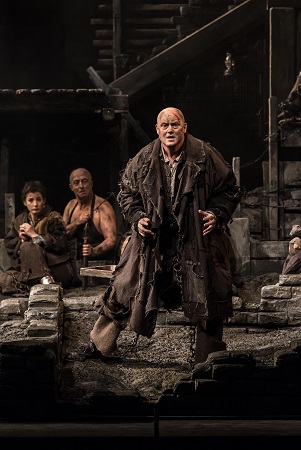 Mark Le Brocq (Luka). Photo credit: Clive Barda.
Mark Le Brocq (Luka). Photo credit: Clive Barda.
Luka is the first to recount his narrative of naked violence, and as he
told of his murder of a guard at another prison, Le Brocq’s tenor was a
formidable force against the abrupt and angular instrumental lines.
Alan Oke’s Skuratov is an unhinged presence during Luka’s account,
wrapping the chains which manacle his hands over his head as if to
inflict further pain upon himself. In Act 2, Skuratov tells his own
heart-rending tale about a woman, Luisa, loved and lost, and her Old
German husband, whom he murdered. The contrast between genuine love and
a rejoicing in murderous vengeance breaks out into a folk-song which
balances precariously between a reminder of the ‘real world’ beyond the
prison and a descent into lunacy. Oke skilfully evoked the different
voices of the personnel of his grim chronicle, momentarily transporting
us to the wider world.
It is Shishkov’s horrifically gripping narration in Act 3, however,
that descends to seemingly unredeemable depths of psychological
anguish. Simon Bailey was a commanding presence, emerging from the
obscurity where he had lingered up until this point to recount his
story of loyalty and betrayal. Bailey’s bass-baritone grew more intense
and compelling through his 20-minute confession. He had married
Akulina, despite Filka’s declaration that he had taken Akulina’s
virginity, but upon learning that Filka was indeed the man she truly
loved, he had slashed Akulina’s throat.
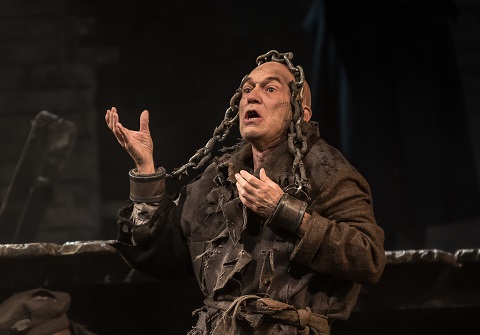 Alan Oke (Skuratov). Photo credit: Clive Barda.
Alan Oke (Skuratov). Photo credit: Clive Barda.
Amid such desolation, Jan·?ek does offer tentative glimmers of
brightness. The role of the young Alyeya is cast for mezzo soprano
(though sometimes taken by high tenor) and Paula Greenwood’s shining
tone, her voice redolent with emotion as Alyeya sings of her sister and
mother, sailed above the prisoners’ sunken spirits – although such
moments of human warmth can make the resumption of prison life (the
noise of the convicts at work interrupts and smothers Alyeya’s
recollections) even more despairing. Then, there is the wounded, caged
eagle which the prisoners cruelly prod – to torment or keep alive? –
but which, a ‘Tsar of the forests’, recovers and is released, a
parallel to Petrovich’s new-found freedom. WNO’s representation of this
symbolic emancipation was not entirely successful, the somewhat clumsy
puppet of Act 1 replaced by projections for the final release – a
perfectly acceptable approach in theory, but a little unpolished in
execution.
The exaggerated gestures and flashes of colour which characterise
Pountney’s presentation of the two pantomimes which mark the Easter
festivities at the end of Act 2, emphasise the way the dramatic
narratives of ‘Kedril and Don Juan’ and ‘The Miller’s Beautiful Wife’
parallel the prisoners’ destructive experiences of sexual love. The
performances offer relief from the regimentation but also aggravate the
underlying tensions, emphasising the absence of women in the prison –
excepting the women who accompany the priest who offers an Easter
blessing and the prostitute who plies her trade – and the prisoners’
own failures.
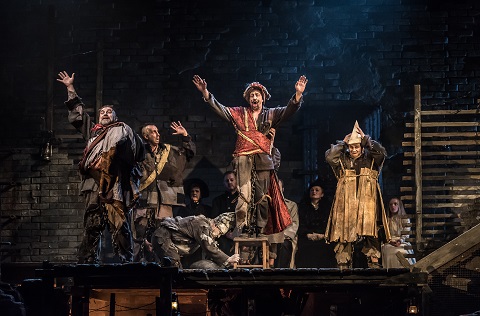 Paul Charles Clark, Laurence Cole, Julian Close, Adrian Thompson. Photo credit: Clive Barda.
Paul Charles Clark, Laurence Cole, Julian Close, Adrian Thompson. Photo credit: Clive Barda.
The production also confirms the compassion and consolation that is to
be found amid such degeneracy and despair. Robert Hayward’s
Commandment, previously so brutishly angered by Petrovich’s dignity,
was almost lost for words when he asked Petrovich for forgiveness for
his unjust treatment. Peter Wilman’s Old Convict rose with surprising
fortitude and presence to affirm his reconciliation to camp life: after
Shishkov has attacked Luka (whom he has recognised as the treacherous
Filka), the old man calmly declared, ‘He was born of a mother too’,
though the prisoners’ struggle to comprehend what it means that ‘a
human being has died’.
In his last opera, Jan·?ek eschews the climactic apotheoses and
melodrama with which some of his earlier operas close – and the sort of
romantic transfiguration of the kind that, depicting a similar context,
Franco Alfano indulges in the final scenes of Risurrezione
which I recently saw at the
Wexford Festival
. Pountney closes with the savage stamping of the concluding march
dissolving into the darkness. The oppression is overwhelming, the
routine will continue, unchanged: the realism of K ·t’a Kabanov· pushed to its extreme.
Jan·?ek wrote of his ‘black opera’ to Kamila Stˆsslova: ‘It seems to me
that I am gradually descending lower and lower, right to the depths of
the most wretched people of humanity. And it is hard going.’ Watching From the House of the Dead can give rise to similar dejection
and disorientation. But, the warmth of the lyrical exchanges between
Alyeya and Petrovich at the close bring both hope and frustration: the
latter’s freedom entails separation. Perhaps for the first time we feel
empathy.
Previous WNO tours have seen Tom·ö Hanus at the helm for performances
of John Copley’s 2011 production of Johann Strauss II’s Die Fledermaus, but on this occasion the task fell to James
Southall who ensured that the bubbles did not go flat. The opening
chords popped like exploding champagne corks, kick-starting a
scintillating overture which set the tone for the entire orchestral
performance – one characterised by lightness and grace, rhythmic zest,
string playing which sparkled and then swooned, woodwind by turns silky
then razor-sharp, and spot-on tuning. Swift tempos kept self-indulgence
at bay – Southall didn’t over-egg the rubatos in the waltz – and
vivaciousness ruled the day.
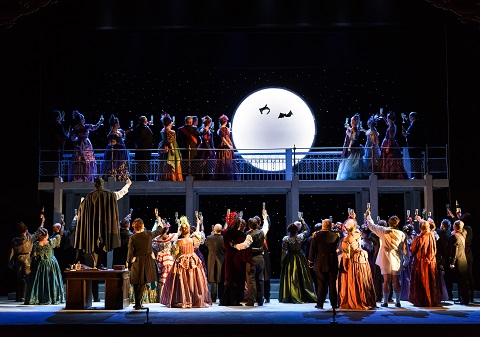 Cast of Die Fledermaus. Photo credit: Bill Cooper.
Cast of Die Fledermaus. Photo credit: Bill Cooper.
Strauss’s belle Èpoque frivolity seemed a rather odd companion
for the three Slavic dramas of the Russian Revolution
triptych. And, while it is a hangover from the company’s Vienna Vice season, there’s not much degeneracy or danger to
be found in Copley’s Viennese merriment despite the fact that the
criminal justice system lies at the heart of the drama of mistaken
arrest, prison avoidance and voluntary incarceration. But, given the
lessons learned when Christopher Alden looked for some darkness amid
the bats and ballrooms at
ENO
in 2013, that’s no bad thing. And, it’s certainly a
crowd-pleaser/audience-puller, offering some sunshine should the clouds
of Slavic gloom seem like heavy weather. Moreover, with Strauss’s
Viennese high society on the cusp of financial destabilisation and
members of the government being carted off to gaol for debauchery and
corruption, one doesn’t have to look too deeply to find some telling
contemporary parallels which add a delicate satirical frisson to the
light-weight comedy. The only difference is, perhaps, that nowadays we
are less likely to be surprised by the shocking behaviour of the
wealthy and the ruling classes.
Tim Reed’s elegant set gives no hint of imminent economic panic and
depression, however; in contrast, the graceful balustrades of the
spiral staircase which rise from the art nouveau tastefulness of the
Eisensteins’ drawing-room to the airy terrace balcony above seem an
aptly elegant metaphor for the social and financial ladder that the
would-be elite are rapaciously ascending.
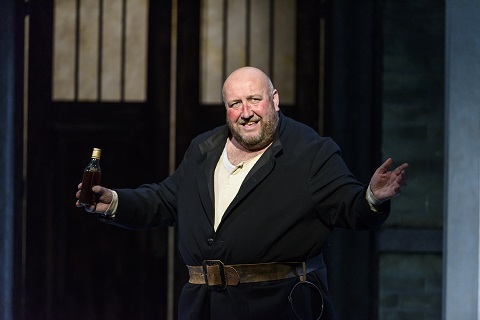 Steve Speirs (Frosch). Photo credit: Bill Cooper.
Steve Speirs (Frosch). Photo credit: Bill Cooper.
The comic capers spin with a light touch, arising naturally from the
musical esprit, although the compulsion of Paul Charles Clarke’s Alfred
to burst into song – not just in his gaol cell, but also off-stage
before the show begins, and whenever the dialogue pauses for breath –
is a bit wearing, despite the tenor’s bright ring. Rossini, Verdi,
Puccini all get a look in, the latter somewhat anachronistically as
Rosalind is drawn into a ‘Nessum Dorma’ duet; and Alfredo, having taken Tosca a little too much to heart, flings himself from the
terrace balcony, only to bounce back up again. In Act 3, the drama is
momentarily put on hold by the arrival of Steve Speirs’ Frosch, whose
Tommy Cooper meets Macbeth’s Porter piËce de rÈsistance was followed by Colonel Frank’s inebriated
ineptitude, ably delivered by James Cleverton whose distorted vision we
shared via some slippery coat-hook sliding and the over-active agility
of the Wilhelm I’s portrait’s florid moustache. It was quite a relief
when Adele (Rhian Lois) reappeared, confessing that she had been the
Eisensteins’ maid, and the music was restored to centre-stage.
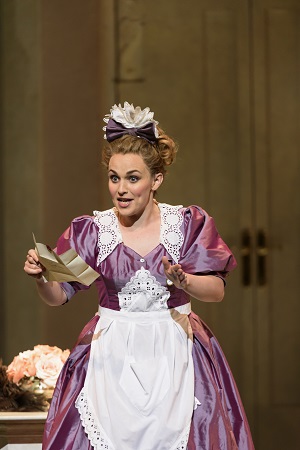 Rhian Lois (Adele). Photo credit: Bill Cooper.
Rhian Lois (Adele). Photo credit: Bill Cooper.
The cast are uniformly attuned to the spirit of Copley’s production.
Judith Howard is a lively Rosalinde, only too aware of her husband’s
short-comings and dalliances. She slipped into a juicy cod-Hungarian
accent for her Cs·rd·s and the high notes were similarly plump. At ENO
in 2013, Rhian Lois’s Adele was a welcome light amid the prevailing
Freudian shadows, and here she was similarly vibrant, delivering a
particularly glittering ‘Laughing Song’: Lois has obviously got the
role as securely under her belt as Adele has her wily ‘betters’ under
her thumb. I was impressed by Anna Harvey’s Prince Orlovsky, who for
once was not mired in misanthropic melancholy but merely seemed to wish
for some properly disinhibited partying. The challenging range and
leaps of ‘Ich lade gern mir G‰ste ein’ (I love to invite my friends)
were negotiated with the same ease that saw Orlovsky throw back the
vodka shots and toss the tumblers over his shoulder.
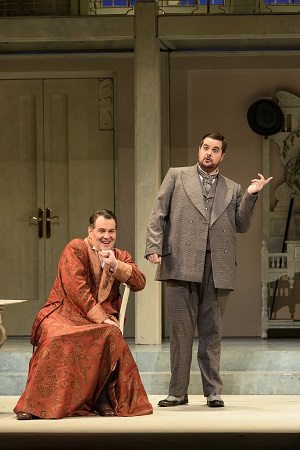 Mark Stone (Eisenstein) and Ben McAteer (Falke). Photo credit: Bill Cooper.
Mark Stone (Eisenstein) and Ben McAteer (Falke). Photo credit: Bill Cooper.
Mark Stein’s Eisenstein was more harmless charmer than crooked cad.
Stone makes it all look and sound easy, but fashioning such musical
charisma and deft comic judgment takes hard work. Such is this
Eisenstein’s hapless inefficacy and vocal allure that one feels one
would forgive him any indiscretion. He’s even fairly patient with his
incompetent lawyer, Dr Blind (Joe Roche) and forgiving of Ben McAteer’s
cruelly vengeful Dr Falke. The slick couplets and adroit internal
rhymes of David Pountney and Leonard Hancock’s witty translation were
clearly enunciated by all – I rarely needed to glance at the surtitles.
Some of the choral numbers could do with a shot of Orlovsky’s vodka.
The WNO Chorus spin and swirl gracefully through the decorative arches
of the ballroom, but while their gowns dazzle and glint under Howard
Harrison’s purple-tinged light, the dancing is on the sedate side.
Hardly the wild nights for which the Prince longs. But, while Strauss’s
sachertorte may be a little too saccharine at times, the revenge of the
bat, silhouetted against the gleaming moon in the closing tableau,
provides some beguiling magic.
The WNO autumn tour
continues until 2nd December in Liverpool, Bristol and
Oxford.
Claire Seymour
Johann Strauss II: Die Fledermaus
Alfred – Paul Charles Clarke, Adele – Rhian Lois, Rosalinde – Judith
Howard, Gabriel von Eisenstein – Mark Stone, Dr Blind – Joe Roche, Dr
Falke – Ben McAteer, Colonel Frank – James Cleverton, Prince Orlovsky –
Anna Harvey, Orlovsky’s servant – George Newton-Fitzgerald, Ida –
Angharad Morgan, Frosch – Steve Speirs; director – John Copley,
conductor – James Southall, revival director – Sarah Crisp, designer –
Tim Reed, lighting designer – Howard Harrison, costume designer –
Deirdre Clancy, choreographer – Stuart Hopps, WNO Orchestra and Chorus.
Birmingham Hippodrome; Wednesday 1st November 2017.
Jan·?ek: From the House of the Dead
Goryanchikov – Ben McAteer, Alyeya – Paul Greenwood, Luka Kuzmich/Filka
Morozov – Mark Le Brocq, Big Convict – Paul Charles Clarke, Small
Convict – Quentin Hayes, Commandment – Robert Hayward, Old Convict –
Peter Wilman, Skuratov – Alan Oke, Drunken Convict – Michael
Clifton-Thompson, Chekunov/The Priest – Alastair Moore, The Cook –
Laurence Cole, The Smith – Martin Lloyd, Young Convict – Adam Music, A
Whore – Sarah Pope, Kedril – Simon Crosby Buttle, Shapkin – Adrian
Thompson, Shishkov – Simon Bailey, Cherevin/Off-stage Voice – Gareth
Dafydd-Morris, Don Juan – Julian Close, A Guard – Joe Roche, Four
Actors – Matthew Batte, Nick Hywell, James Rockey, Dafydd Weeks. Female
Child – Lillyella-Mai Robertson/Iona Roderick; director – David
Pountney, conductor – Tom·ö Hanus, designer – Maria Bjˆrson, lighting
designer – Chris Ellis, lighting realied on tour – Benjamin Naylor, WNO
Orchestra.
Birmingham Hippodrome; Thursday 2nd November 2017.